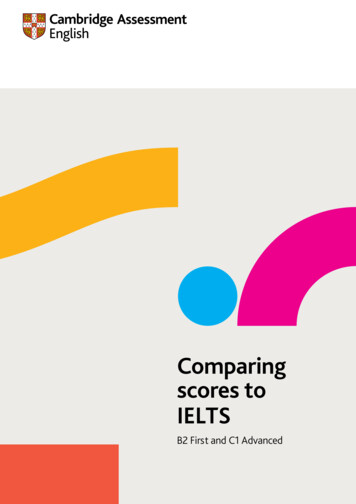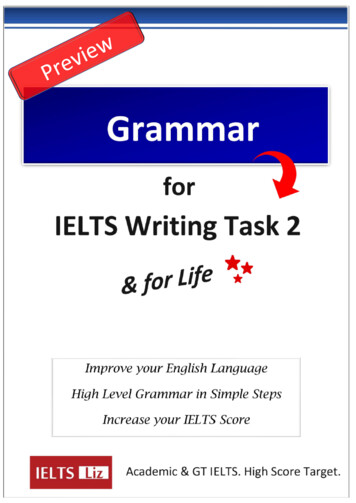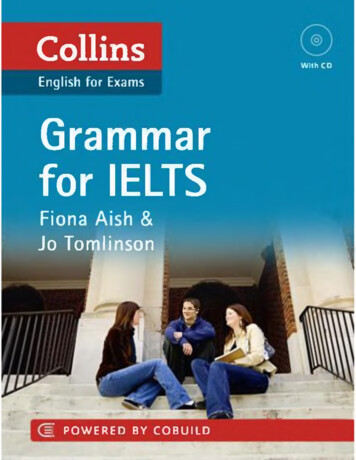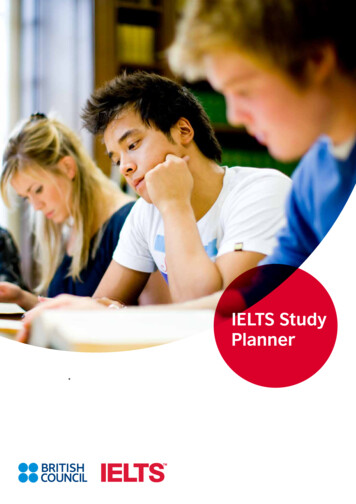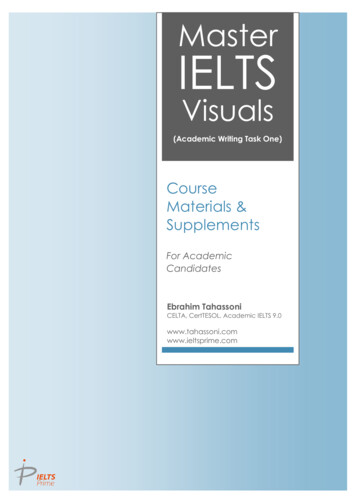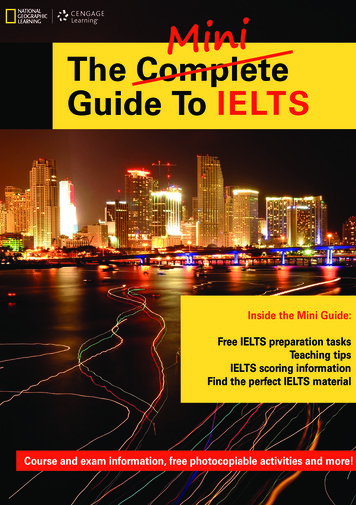
Transcription
from ielts2.com
from ielts2.comIELTS BAND 9GRAMMAR SECRETSImprove your Academic EnglishTo GetBand 9 in IELTSPublished by Cambridge IELTS ConsultantsCambridge, United KingdomCopyright Cambridge IELTS Consultants and Jessica Alperne, Peter Swires 2014.All rights are reserved, including resale rights.This e-book is sold subject to the condition that it will not be copied,duplicated, stored or distributed for any purpose or in any form.No part of this book may be reproduced or transmitted in any form or by any means,electronic or mechanical, or by any information storage and retrieval system without written permissionfrom the authors.2
from ielts2.comOn Amazon from the same publisher:Packed with advice, examples and Band 9 models for you to follow!3
from ielts2.comT able o f C o ntentsIntroduction from the authorsFrequently Asked Questions about Academic EnglishModule 1: (1.1) Structure (1.2) Conjunctions (1.3) Impersonal styleModule 2: (2.1) The introduction (2.2) Using conditionals (2.3) Tentative phrasesModule 3: (3.1) Concession (3.2) Linking the sentences (3.3) Academic vocabModule 4: (4.1) Paragraph structure (4.2) Using evidence (4.3) Reporting viewsModule 5: (5.1) Passives (5.2) Complex adjectives (5.3) Cause and effectModule 6: (6.1) Avoiding emotion (6.2) Evaluating evidence (6.3) Noun personsModule 7: (7.1) Rejecting arguments (7.2)Topic-specific vocabulary (7.3) ConclusionsModule 8: (8.1) Problems (8.2) Solutions (8.3) Time & probability qualifiersModule 9: (9.1) Presenting disadvantages (9.2) Presenting alternatives (9.3) CollocationsModule 10: (10.1) Complex sentences (10.2) Academic phrases (10.3) Balanced conclusionsThe 10 most common mistakes in IELTS academic writingHelp from the experts4
from ielts2.comIntro ductio n fro m the autho rsIt is surprising how many people take the IELTS academic exam without studying how to writegrammatically in Academic English. This is risky, because the examiners expect you to use the principles of thistype of English. By practising the grammar of Academic English, you will have a much higher chance ofachieving the band you need, even if your English is not perfect.In this book, we have 10 Modules which explain the key concepts of Academic English. Each modulehas an IELTS Task 2 question, identical to the ones you will meet in the exam. Each module has a modelessay written to Band 9 standard, and then three key grammar points to explain why the essay demonstrates agood use of Academic English. For example, Module 1 teaches you about: (1.1) structure (1.2) conjunctionsand (1.3) impersonal style.Each Module then has a practice Task for you to try using the methods you learn. Try to do theseTasks as you finish each Module, writing an essay of 250 words in 40 minutes. Because IELTS is still a paperbased exam, you should practice writing these essays by hand on paper, rather than on a computer.By using all of the key points from these Modules, you will make a huge difference to the IELTSexaminer’s impression of your English grammar, your writing, and thus your final result.Remember – you should also use these methods when you are writing your essays and reports atcollege, University or at work in any English-speaking situation.If you need a dictionary while reading this book, we recommend the free Cambridge DictionariesOnline from Cambridge University Press.Don’t just trust to luck in your IELTS exam – the key is expert advice!Jessica Alperne & Peter SwiresCambridge IELTS Consultantscambridgeielts@outlook.com5
from ielts2.comF requently Ask ed Q uestio ns abo ut Academic E nglishW hat is Academic E nglish and w hy is it impo rtant?This is the type of English used in formal writing for exams and essays everywhere in the Englishspeaking world.H o w is it different fro m no rmal, day-to -day E nglish?The vocabulary tends to be more formal, and the grammatical structures are more advanced. There arealso high expectations of how you should present and explain your ideas, and the way that paragraphs andsentences are organised. This book explains these principles and shows you a wide range of examples.W hat happens if I do n’t use Academic E nglish in my IE LT S Academic W ritingtest?Unfortunately, it will be impossible to achieve over a Band 6 unless you show a reasonable commandof Academic English. Remember, your essay does not have to be perfect, but you must show the examiner thatyou understand the principles of Academic English and you have tried to use them.D o I have to use Academic E nglish in the IE LT S Speak ing test to o ?This question sometimes causes confusion. In the Speaking test, you should use the most advancedvocabulary you can, and give structured answers (see our ‘Band 9 Speaking’ book for full information aboutthis.) However, you do not need to ‘speak like an essay’ or use formal words such as ‘nevertheless’ or‘moreover.’6
from ielts2.comM o dule 1: (1.1) Structure (1.2) C o njunctio ns (1.3) Imperso nal styleExample writing TaskSome people believe that all children should have a pet or an animal to look after. Otherpeople disagree, however, saying that this depends on a child’s circumstances. Consider these opposingviews, and give your own opinion.Explanation of the TaskThis is an Opinion Discussion type Task. You should introduce the topic, discuss both sides of theargument, and give your opinion in the conclusion.Band 9 model essayIt is often said that children benefit from caring for domestic animals, especially in today’s technologyfocussed world. However, the issue is not entirely straightforward, and arguments can also be made against theidea. This essay will discuss the debate, and give a concluding view.On the one hand, those who support the ownership of pets cite the various benefits that the activitycan bring to a child. These range from understanding nutrition, to learning about biology and daily routines.For example, food selection and exercise activities contribute to this strand of development, which adds greatlyto a child’s all-round education. Another argument is the emotional support that children receive from pets,meaning that the child feels more secure and thus more confident.By contrast, opponents of this view point out that not all children live in a situation where petkeeping is advisable, or even possible. Examples can be seen in less affluent countries, where the expense ofmaintaining a pet may be prohibitive. In addition, many children live in unstable family environments, due tosuch issues as unemployment or political turbulence. For these families, pets would probably suffer neglect,meaning that it would be unfair to keep them, or possibly even dangerous. Finally, it must be said that not allyoung people actually want to keep a pet, because their interests lie elsewhere. For these youngsters, animalownership should not be encouraged.Overall, it seems advisable that the decision to keep a pet should be based on a child’s interest, abilityand family circumstances, rather than on a general view that ‘all children’ should have animals. It would appearthat this serves the interests of both the children and the pets involved.(278 words)Module 1.1StructureThis essay follows a classic Academic English structure for Opinion Discussion Tasks, and theexaminers will expect you to use something similar to this.The introduction paragraph gives some background to the topic, and emphasises that this is an issuewith differing arguments which the essay will consider. Because this is an Opinion Discussion type essay, thecandidate does not give an opinion in the first paragraph. Remember that in any Task 2 essay, two or three7
from ielts2.comsentences are sufficient for the introduction.The main body is divided clearly into two large paragraphs, each one presenting one side of the debate.Each paragraph has two or three ideas to support the view being presented. There is continuity between thesecond main body paragraph (which is against the universal keeping of pets) and the conclusion (which is alsoagainst this.) Because this is an Opinion Discussion type essay, the candidate only gives his opinion in thefinal conclusion.In the IELTS Academic test, this Task type is the most common, so you should practice followingthis model structure.Module 1.2ConjunctionsConjunctions are linking words or phrases which connect ideas and sentences. This essay uses some ofthe most important academic conjunctions to inform the reader that the ideas are changing:HoweverOn the one handAnother argument isBy contrastIn additionFinallyOverallThere are also conjunctions to show that the ideas are being illustrated with examples:These range from . . . to . . .For exampleExamples can be seen inWhen writing this type of essay, try to keep these words and phrases in mind, and use them in the waythat this model essay uses them.Module 1.3Impersonal styleIn Academic English, it is possible to say ‘I think/I believe/I feel’ etc to give your opinion, if the Taskasks for your view. However, you will increase your score if you show that you can use impersonal ways toexpress a view in the conclusion. ‘Impersonal’ means that you don’t refer to ‘I’ but you use alternatives. Thisessay uses:Overall, it seems advisable thatIt would appear thatThe examiner will recognise that you are giving an opinion in an academic, impersonal way, and willbe impressed by this. In Opinion type essays, try to use one of the following phrases at least once, to expressyour view:8
from ielts2.comItItItItItItseems thatwould seem thatappears thatwould appear thatis logical to conclude thatis sensible to conclude thatModule 1 practice TaskThe following practice Task is another Opinion Discussion type Task, like the example we saw inModule 1. Try to write an essay for it in 250 words in about 40 minutes, using these Module 1 learningpoints about structure, conjunctions and impersonal style.Some people feel that boarding schools (where students or pupils live at the school during theterm) are an excellent option for children, while other people disagree for a number of reasons.Consider both sides of this debate and reach a conclusion.***9
from ielts2.comM o dule 2: (2.1) T he intro ductio n (2.2) U sing co nditio nals (2.3)T entative phrasesExample writing TaskMany people today find that the cost of attaining a University-level education is extremelyhigh for the students and their families. What are the causes of this situation, and how cangovernments, Universities and the students themselves overcome the problem?Explanation of the TaskThis is an Ideas Mixed Task, asking for some ideas about the causes of a problem and also possiblesolutions. It does not ask for your opinion (for example, if you think that University is useful or worth thecost.) You should introduce the topic, suggest two or three causes, then two or three solutions, and thensummarise.The Task refers to solutions from “governments, Universities and the students themselves” and soyou should think of an idea for each of these areas.Band 9 model essayWhile many young people aspire to attending University, the expense involved can be prohibitive insome cases. The causes of this appear to be focussed on three areas, and a number of solutions also appear to bepossible.Perhaps the major factor here is the reduction in government subsidy for University courses. Forinstance, in the UK, such courses were virtually free to the student until recently, but now cost around 30,000 per year. This pattern appears to be global, with the result that students and their families need tomeet the costs directly. Another cause is the increasing cost of living in many countries, meaning that the costof day to day life (in addition to fees) can be almost overwhelming for students. A third factor is the difficultyin finding part-time work while a student is studying. Such work tends to be poorly paid, while taking uptime that students should use for their studies.Turning to possible solutions, an obvious step would be to restore some element of state funding tocourses. Although public budgets are under pressure these days, if we took this step it would greatly enhanceaccess to courses for people on lower incomes. A second remedy might be for the Universities to offer shortercourses, or more courses with an element of professionally paid work experience included. If such courses weremore available, it would reduce the issue of living expenses to some extent. Finally, students themselves shouldperhaps be more flexible in their attitude to education, and consider attending University at a later stage, orpossibly only when they have accumulated sufficient funds to support themselves.In summary, the factors of funding and cost of living appear to be the main causes. A coordinatedresponse by the state, the institutions and the individuals may well lessen the severity of the situation.(298 words)Module 2.1The introduction10
from ielts2.comIn any essay, the first sentence of the introduction paragraph should give some general backgroundinformation about the topic, and if possible say why the topic is important. The second sentence should makeit clear to the examiner that you understand the type of essay the Task requires. The simplest way to do this isto outline the content of the main body, so that the reader knows exactly what to expect next.This essay says:The causes of this appear to be focussed on three areas, and a number of solutions also appearto be possible.This emphasises to the reader that the main body will deal with causes and solutions. Another way todo this, using this Task, would be:The origins of this situation seem to stem from three factors, while several remedies appear tobe open to us.Notice that the candidate is using impersonal phrases here (seem/appear and not I think) and alsothat the sentence does not take vocabulary directly from the Task question. It is important to paraphrase asmuch vocabulary as possible, to avoid duplicating from the Task.Useful words to talk about causes of a situation are:OriginsRootsFactorsUnderlying factors/causesThe factors stem from/derive from/flow fromUseful words for solutions include:RemediesWays to solveMethods to address/deal withAnswers to a problemAt the end of your introduction (a maximum of three sentences) the examiner should perceive thatyou understand the topic, and you have communicated what to expect in the main body.Module 2.2Using conditionalsWhen presenting possible solutions, it is traditional in Academic English to use the third conditionalstructure (If simple past would verb.) This essay says:If we took this step it would greatly enhance . . .If such courses were more available, it would reduce . . .This shows that the writer understands that she is discussing a hypothetical situation, and not a case11
from ielts2.comthat exists at the moment. Other examples of this are:If governments were to ban smoking, this would affect . . .If healthcare was cheaper, people could afford to . . .When presenting solutions or recommendations, try to use this third conditional structure.Module 2.3Tentative language‘Tentative’ means that you say that something might be true, or might happen, rather than saying thatsomething is always true or always happens. This is important in Academic English because it shows youunderstand that situations are complex and there tend to be exceptions rather than 100% certainty in life.There are many examples of tentative language in this essay (underlined here):the expense involved can be prohibitivePerhaps the major factorthe cost of day to day life (in addition to fees) can be almost overwhelmingSuch work tends to beA second remedy might bestudents themselves should perhaps beand consider attending University at a later stageA coordinated response . . . may well lessen the severityThese expressions will achieve a much higher score than if you say The expense is prohibitive/Themajor factor is/Such work is and so on. This would be too simple to gain a very high score in IELTS.In your essays, try to use this type of tentative language at least twice, to show the examiner that youunderstand it. For example, instead of:The police should have guns, because this protects themTry to say:The police should consider having guns, because this tends to protect them.Practice TaskCrime appears to be rising in most countries in the world, especially among young people.Identify the possible causes of this trend, and propose some solutions you think would be effective.12
from ielts2.comWhen writing this essay, try to use the learning from this Module about the introduction, usingconditionals and tentative language.***13
from ielts2.comM o dule 3: (3.1) C o ncessio n (3.2) Link ing the sentences (3.3) Academicvo cabExample writing TaskIt is often said that retirement is the happiest time of a person’s life. How far do you agreewith this view?Explanation of the TaskThis is an Opinion Personal Viewpoint Task, asking if you support a given point of view. Thestructure is different from an Opinion Discussion Task. You should introduce the topic, give your opinionin the introduction, and then explain your view. You should briefly consider the opposing view (this is called‘making a concession’) and then restate your opinion in the conclusion.Band 9 model essayIn many countries, the population is ageing consistently, and this presents the older people themselveswith challenges as well as opportunities. It seems to me that retirement is not in fact the most contented periodof life, and I will explain why in this essay.Firstly, retired people have to contend with the major issue of health. No matter how optimistic aperson is, and how conscientiously they try to keep fit, their health will inevitably decline as they grow older.This affects their mobility, their ability to interact with people, and their physical comfort when compared tothe earlier stages of their life. A second negative factor is the whole question of finance. By this we mean thateven people who have saved or invested carefully during their working lives will find their income inretirement reduced considerably, for example by relying on savings. This results in their leisure options beingmore restricted than in their younger years, even though they have more time to fill. This leads us on to thefinal, and perhaps most significant drawback to retirement, which is isolation. This happens when declininghealth and limited resources make people increasingly cut-off, even if they have surviving family members whoseek to care for them. However much the family (or neighbours and social services) may offer support, thislack of contact will lead progressively to a less contented frame of mind.It is true that there are some positives to retirement, most notably the time to pursue personal interestsand the presence of grandchildren in many cases. Despite this, it seems that for many older people, thesepleasures are outweighed by issues which can cause stress and depression.To conclude, the problems of health, financial concerns and isolation combine together to makeretirement a challenging and potentially difficult time for many, especially when compared to the prime periodof life. This is not to say that all retired people suffer in this way, but it appears to be the case very frequently.(343 words)Module 3.1ConcessionIn this Opinion Viewpoint type Task, you should give your opinion in the introduction. Most of the14
from ielts2.commain body is then used to explain the reasons for your opinion. Notice that there is one large paragraph in themain body which does this.After this large paragraph, there is then a smaller paragraph which describes the opposing point ofview, and then rejects it. This smaller paragraph is called a concession. It is important to make concessions inAcademic English, because without this the essay would be too unbalanced and one-sided.This essay makes the concession by saying:It is true that . . . (to describe the opposing view) . . . Despite this (to reject the view, giving a reasonfor rejecting it.)Other useful phrases for making concessions and then rejecting the viewpoint are:Admittedly . . . Nevertheless . . .It might be said that . . . However . . .I accept that . . . In spite of this . . .While it may be correct that . . . It still appears to be the case, however, that . . .In this type of essay, remember to have a small concession paragraph of two or three sentences after thelarge main body paragraph, using phrases similar to these.Module 3.2Linking the sentencesIELTS examiners often say that a common weakness in Task 2 essays is that sentences begin withoutany connection to the previous sentence. This makes the essay difficult to follow. In Academic English, it isimportant to link your sentences together. If you read the essay again, you will see some examples of how thisis done:decline as they grow older. This affects their mobilitythe whole question of finance. By this we mean thatby relying on savings. This results inmore time to fill. This leads us on toisolation. This happens whengrandchildren in many cases. Despite thisthe prime period of life. This is not to say thatIn these examples, the candidate uses the word ‘this’ (or phrases with ‘this’) to refer back to theprevious sentence, helping the reader follow the progress of the argument. The sentences beginning with ‘this’usually give a definition, an explanation or a development of the previous idea.In your essays, especially in the main body, try to use ‘this’ phrases in this way. This applies to all typesof Opinion and Ideas essays, because in all of them you need to give definitions, explanations or developments15
from ielts2.comof your ideas.Module 3.3Academic vocabularyIn English, there are often two possible words for the same idea: an informal or neutral word (which ismostly Anglo Saxon in origin, such as ‘often’) and a more formal word (which is mostly Latin or French inorigin, such as ‘frequently.’) In Academic English, we tend to use the more formal words, because they give theimpression of professionalism and authority.In this essay, the candidate has used a wide variety of formal/academic words. Here are ten of them,with the less formal alternative alongside:Consistently (all the time less formal)Major (big)Contented (happy)Conscientiously (with a lot of care)Decline (get worse)Negative (bad)Considerably (a lot)Significant (big)Pursue (go after)Prime (best)The IELTS examiners expect you to use this formal type of vocabulary rather than the very simple,less formal words such as ‘big’ or ‘small.’ The list of ten words above shows you some of the most frequentformal/academic words. You should definitely try to use most of these words in any Task 2 essay.Practice Task‘Everybody should donate a fixed amount of their income to support charity.’How far do you share this viewpoint?Remember to use the points in this Module about concession, linking your sentences and academicvocabulary.***16
from ielts2.comM o dule 4: (4.1) Paragraph structure (4.2) U sing evidence (4.3)R epo rting view sExample writing TaskSome people support the idea of imposing taxes on fossil fuels (oil, coal and gas) in order toreduce energy consumption. Others disagree with this approach.Consider the debate and its arguments, and come to your own conclusion.Explanation of the TaskThis is an Opinion Discussion type Task. You should introduce the topic, discuss both sides of theargument, and give your opinion in the conclusion.Band 9 model essayMost people agree that the use of fossil fuels should be reduced to some extent. However, imposingtaxes is a controversial tactic which appears to have a number of contradictory effects. We will consider bothsides of the discussion in this essay.On the one hand, those who support taxation of fossil fuels promote the idea that higher prices willlead to lower consumption and thus lower emissions. They point to evidence from countries such as Swedenwhere this appears to be the case, and urge other nations to follow suit. Furthermore, proponents of fuel taxesclaim that the funds raised can then be used to subsidise renewable energy projects such as solar and localisedbiofuel reactors. To the supporters of the idea, these benefits are convincing.However, opponents of fuel tax are able to cite evidence from other countries (including France andItaly) where higher tax has apparently not reduced demand for such fuels. In these cases, the effect has been toforce people to pay more for the same volume of energy, which appears to penalise those who can least affordit. Moreover, critics of fuel tax also highlight the difficulty in governments promising renewable schemeswithout interfering in the entire energy market. If the state was to control the entire market for fuels, they say,this would force suppliers to leave the market, thus reducing competition and efficiency. This argument alsoappears to be quite powerful.Overall, I would tend to side with the opponents of fuel taxation. It seems to be unreasonable to forcevulnerable consumers to pay more for a commodity which is essential to them, without a real infrastructurefor renewable energy being in place. It would be more logical to improve availability of renewables first, whichwould allow consumers to make a genuine choice.(297 words)Module 4.1Paragraph structureIn any IELTS essay, the main body paragraphs must be carefully organised. The classic pattern is tohave two or three ideas in each paragraph. If you have more than three ideas in each paragraph, you will17
from ielts2.comprobably not be able to finish the essay in forty minutes. This applies to all types of essay, both Opinion andIdeas types. In this essay, the candidate has used two ideas in each main body paragraph, to present the possiblearguments on each side.Notice how the ideas are presented: the writer uses a conjunction to introduce each idea (eg On theone hand or Moreover) and then states the idea, followed by a simple example and/or an explanation of theidea. Each idea is generally presented and/or exampled/ explained in two or three sentences:On the one hand, those who support taxation of fossil fuels promote the idea that higherprices will lead to lower consumption and thus lower emissions. They point to evidence from countriessuch as Sweden where this appears to be the case, and urge other nations to follow suit.When you are writing your main body paragraphs, try to organise them like this. Have two or threeideas, each idea being presented and/or exampled/explained in two or three sentences. Remember to useconjunctions to introduce the ideas.Module 4.2Using evidenceIn the Task 2 instructions on the IELTS exam paper, the test tells you to ‘use examples and evidencefrom your own knowledge and experience’ (the exact words may vary, but the general instruction is always thesame.) Remember that ‘your own knowledge and experience’ does not mean events that have happened to youpersonally or your friends and family. It means facts that you have read about in the media, or that you knowfrom your own education.In this essay, the candidate has used evidence from Sweden, France and Italy, but she has not given lotsof statistics or numbers, which would be too detailed. In any Task 2 essay, try to use evidence in this way: referto facts that you know about (not personal stories) and do not give too many statistics. In this way, your essaywill be convincing and still easy for the examiner to read.Module 4.3Reporting viewsWhen you are discussing different sides of an argument, it is a good idea to imagine how thesupporters of one side would justify their views:On the one hand, those who support taxation of fossil fuels promote the idea that . . .Furthermore, proponents of fuel taxes claim that . . .However, opponents of fuel tax are able to cite evidence . . .Moreover, critics of fuel tax also highlight the difficulty . . .By reporting other people’s opinions in this way, your essay will be more interesting and the examinerwill feel that you are able to balance arguments well.Useful phrases to report views are:Supporters of/ Proponents of/ Those who support x18
from ielts2.comOpponents of/ Critics of/ Those who oppose xSupporters etc cite/refer to/highlight/point to xSupporters etc claim that/ say that/ insist that x is correctSupporters etc deny that/ reject that/ do not accept that x is correctIn your essays, try to use this type of ‘reporting’ method at least once in the main body.Practice TaskSome countries today have passed laws against smoking tobacco in public buildings such asoffices and restaurants. Other countries have no intention of doing this.Consider the possible arguments on both sides of this debate, and reach your own conclusionon which side you favour.Remember to use the points we studied in this Module about paragraph structure, using evidence andreporting views.***19
from ielts2.comM o dule 5: (5.1) Passives (5.2) C o mplex adjectives (5.3) C ause and effectExample writing TaskMany countries today are experiencing problems associated with noise pollution (excessivenoise above a normal background noise.) What are the causes of this phenomenon, and what effectsdoes it have on the people affected?Explanation of the TaskThis is an Ideas Cause/Effect essay. You should introduce the topic, then suggest two or three causes,plus two or three effects, and then summarise in the conclusion. Remember that this type of Task is not askingfor your opinion (eg whether you think noise pollution is important or not) but for some ideas about causesand effects. Notice that this particular Task does not ask you to suggest any solutions.Band 9 model essayNoise pollution is a less-discussed form of pollution, but one which can have depressing effects on thepeople concerned. There seem to be two main causes, and a number of effects, which we will discuss here.Possibly t
Title: IELTS Band 9 Grammar Secrets - Band 9 Grammar Methods for Academic Writing Task 2 Author: Cambridge IELTS Consultants Created Date: 1/4/2016 10:56:05 AM

